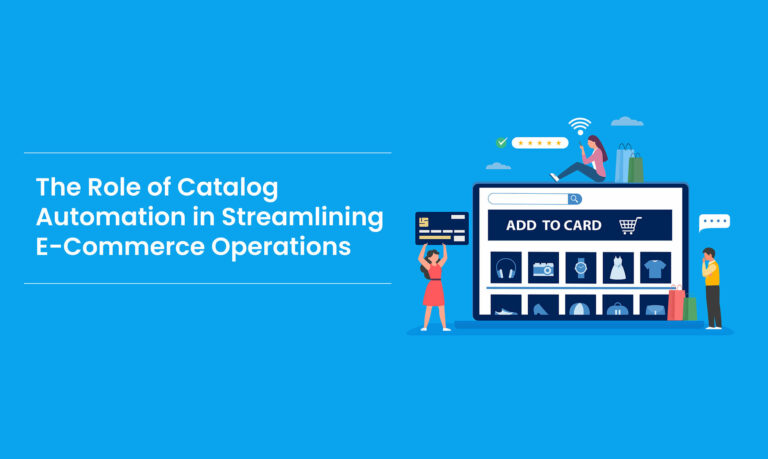E-commerce merchandising is changing quickly as a result of AI-driven technologies like smart tagging solutions that are changing successful techniques. These solutions, which are driven by sophisticated algorithms, improve discoverability, optimize e-commerce product catalog, and customize suggestions, resulting in increased consumer engagement and conversion rates. AI-powered product tagging augments user experiences by tailoring product suggestions based on individual preferences and historical data, fostering stronger connections between consumers and online platforms.
Additionally, by focusing marketing efforts, it increases conversions and simplifies inventory management. Even if integrating AI presents hurdles, successful deployment is ensured by transparency, moral behavior, and strategic alignment with corporate goals. AI-driven retail techniques promise to be dynamic as technology develops, always adjusting to customer trends and market fluctuations. Accepting these developments gives organizations the ability to prosper in the cutthroat world of online shopping, benefiting both clients and enterprises.
Introduction
In today’s ever-evolving digital marketplace, everyone’s attention spans are fleeting. But there is no laying back in competition. In such a phase, e-commerce success hinges on more than just a sleek website and a diverse product catalog. The key lies in the captivating dance between data, sales strategy, and aesthetics – a delicate art form known as e-commerce merchandising. It is like an invisible hand guiding conversions, transforming browsers into loyal buyers.
Currently, this strategy is undergoing a profound revolution. Businesses are infusing it with the magic of artificial intelligence (AI). Gone are the days of relying solely on human intuition and static merchandising tactics. AI is reshaping merchandising in e-commerce. This technology is empowering brands to personalize, optimize, and automate their strategies for maximum impact.
In this post, we will be taking a deeper look at smart tagging solutions. These tools, powered by advanced AI algorithms, are redefining the way products are categorized, discovered, and recommended in the digital marketplace. It will enlighten you on how smart tagging solutions are becoming integral to the fabric of digital merchandising. Let’s understand how it influences customer interactions and, consequently, the success of online businesses.
Understanding E-commerce Merchandising
E-commerce merchandising is the strategic presentation and promotion of products in the digital realm. Its significance lies in shaping user experiences, influencing purchasing decisions, and ultimately driving sales. Current statistics underscore the pivotal role of effective e-commerce merchandising strategies in capturing consumer attention and fostering brand loyalty. Importantly, the symbiotic relationship between merchandising and the broader sales strategy is evident. A well-crafted merchandising approach directly impacts overall e-commerce success.
The Evolution of E-commerce Merchandising Strategy
The evolution of e-commerce merchandising traces a shift from traditional in-store displays to dynamic digital merchandising. This transition underscores the need for adaptable approaches to changing consumer behaviors and technological advancements.
E-commerce businesses have always been encountering several challenges in crafting and executing effective sales strategies. These hurdles include fierce competition, short attention spans, and the constant evolution of online platforms. Addressing these difficulties is key to sustained success in the digital marketplace.
Digital merchandising emerges as a game-changer in the online retail landscape. It involves the strategic use of digital platforms to curate product displays, optimize user experiences, and enhance customer engagement. Understanding and leveraging this approach will allow businesses to thrive in the contemporary e-commerce ecosystem.
AI in E-commerce Merchandising
Staying one step ahead is always imperative for sustained growth. This is especially true in today’s fiercely competitive e-commerce landscape. So, this section emphasizes the need for innovation to capture consumer attention, retain relevance, and outpace rivals.
Artificial Intelligence is currently a pivotal tool in overcoming challenges faced by e-commerce businesses. From analyzing vast datasets to predicting consumer trends, AI enhances merchandising strategies. It helps make them more agile, responsive, and effective.
The interaction between AI, e-commerce, and merchandising is a transformative force. The seamless integration of AI-powered tools and algorithms into e-commerce platforms is revolutionizing merchandising efforts. This collaboration augments customer experiences and drives business success.
Understanding Smart Tagging Solutions
Now, you can understand how staying at the forefront of innovation is paramount. So, to enhance your business reach, companies like Rubick.ai offer smart tagging solutions. This is a cutting-edge AI application of AI, revolutionizing the way products are managed and showcased online. Let us now delve into the basics of smart tagging.
Definition
Smart tagging solutions involve using AI-driven algorithms to assign metadata or tags to products. It enhances their identification, categorization, and overall management. This advanced technology goes beyond conventional labeling. It employs machine learning to understand product attributes and consumer preferences, ultimately optimizing the online shopping experience. The framework is trained to automatically apply both business-specific and standard tags to different media assets by recognizing them.
Why Use Smart Tagging Solutions?
One of the key benefits of smart tagging is its ability to enhance e-commerce merchandising significantly. By categorizing items based on nuanced attributes, such as size, color, and style, smart tagging ensures improved product visibility. It can present the products to consumers in a highly personalized and relevant manner. This simplifies the search process and facilitates cross-selling and upselling opportunities.
Example
Several e-commerce trailblazers have successfully implemented smart tagging solutions, showcasing the tangible benefits of this technology. One of the leading examples is the renowned beauty and cosmetics retailer Sephora.
With a diverse product line, it took a lot of work for the company to predict individual customer preferences accurately. This is why Sephora leveraged smart tagging solutions with powerful predictive analytics. It led to the generation of personalized email campaigns and in-app recommendations based on individual beauty profiles and purchase history.
The business then saw a significant boost in email open rates, click-through rates on personalized recommendations, and better conversion rates.
From industry giants to niche players, businesses take the benefit of smart tagging for several reasons. It includes:
- Streamlined inventory management
- Personalized product recommendations
- Boosting conversions
Impact of Smart Tagging on E-commerce Merchandising Strategy
Merchandising in e-commerce has experienced a paradigm shift with the integration of smart tagging solutions. It ushers in a new era of strategic product management. The impact of smart tagging is multifaceted, significantly influencing various aspects of the digital merchandising strategy.
- Smart tagging boosts customer experience by enabling unprecedented levels of personalization. It analyses user behavior, preferences, and historical data to curate tailored product recommendations for each individual. As a result, it enhances user engagement and fosters a connection between the consumer and the online platform. This approach altogether contributes to better conversions.
- Smart tagging serves as a powerful ally in the quest for improved product discoverability. The meticulous categorization and tagging allow the products to become more searchable and discoverable within the vast inventory of an e-commerce platform. It eases the browsing experience for customers and also encourages exploration. It exposes users to a wider array of products and increases the likelihood of discovering their preferred items.
Simply put, smart tagging solutions to browse for particular items. This specific search can increase the conversion rate. The search feature has shown a significant 2% increase in conversions. Product tags are not only a helpful sales strategy but also a useful SEO practice. Shopify is a major example of that. When consumers search with specific keywords on browsers, and the results show the products on particular e-commerce sites, it is because of this smart tagging solution.
The collective influence of smart tagging on customer experience, product discoverability, and conversion rates solidifies its role as a cornerstone in the evolution of e-commerce merchandising strategies. As technology continues to advance, smart tagging is poised to remain a dynamic force, continually reshaping the online shopping landscape.
Leveraging AI for Dynamic Sales Strategy
The infusion of Artificial Intelligence into e-commerce merchandising has brought about a revolution in sales strategy. It enables businesses to operate with unprecedented precision and adaptability.
The integration of AI-driven insights into the sales strategy allows businesses to understand better customer preferences, purchasing patterns, and emerging trends. This allows for dynamic sales strategy formulation that responds in real-time to market shifts, ensuring relevancy and competitiveness.
Smart tagging solutions, driven by AI, generate a wealth of valuable data regarding customer interactions and preferences. This data becomes a strategic asset in targeted marketing campaigns and promotions. It can optimize promotional activities for maximum impact.
A key strength of AI lies in its ability to predict and adapt to evolving consumer preferences. Advanced algorithms and machine learning allow AI systems to analyze historical data. It can identify subtle shifts in consumer behavior. This foresight enables businesses to proactively adjust their sales strategies, product offerings, and marketing tactics to align with emerging trends.
With the evolution of technology, AI integration into sales strategies is poised to become increasingly sophisticated. It will keep offering businesses a competitive edge in the dynamic world of online retail.
Overcoming Challenges and Ensuring Effective Implementation
Well, the integration of AI and smart tagging solutions in e-commerce merchandising is challenging.
- Apprehensions and concerns range from data privacy to job displacement. So, it is important to promote transparency, ethical AI practices, and clear communication to build trust among stakeholders.
- Implementing smart tagging solutions requires a strategic approach to maximize their impact. Data accuracy, regular updates, and alignment with business objectives can ensure successful integration.
- Digital merchandising strategies can be optimized by leveraging AI-driven insights effectively. So, businesses need to align their digital merchandising efforts with AI capabilities. From continuous monitoring and analysis to adapting strategies based on real-time data, these can empower companies to refine their approach and stay competitive in the ever-evolving e-commerce landscape.
Businesses must proactively address concerns, embrace best practices, and optimize digital merchandising strategies with AI for successful implementation. This holistic approach ensures that the transformative power of AI and smart tagging is harnessed to its fullest potential. This, in turn, can drive positive outcomes for both the businesses and their customers.
Conclusion
The significance of e-commerce merchandising cannot be overstated in today’s highly competitive online marketplace. As highlighted throughout this exploration, the strategic presentation and promotion of products play a pivotal role in influencing consumer behavior and driving sales.
The impact of smart tagging solutions on e-commerce merchandising strategies has been profound. It can enhance product visibility, personalize customer experiences, and optimize search functionalities. These AI-driven innovations are reshaping the way businesses curate and showcase their offerings. Industry experts like Rubick.ai can help you with these smart tagging solutions for maximized conversions.


